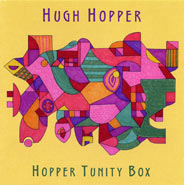
Hugh Hopper
Hopper Tunity Box
(Cuneiform)
Just
think about it: Of how many composers/instrumentalists one could say that
they possess a highly personal style, a "sonic signature", so
to speak, that’s unmistakably theirs? Not too many, I think. It’s already
quite difficult to possess an individual "style" as either a
composer or an instrumentalist, but both? Forget it. One of the few of
whom, in my opinion, this can be said is Hugh Hopper: master composer,
instrumentalist supreme. And this was true right from the start: one needs
only to listen to Soft Machine’s Volume Two (released in 1969, it’s one
of those albums I definitely can’t imagine any home not having – at the
very least – one copy): it’s all there, the fuzz bass, those beautiful,
at times quite angular, melodies. After Volume Two, also required listening
are Soft Machine’s Third (1970), Fourth (’71), and Fifth (’72). Even on
the last album Hopper recorded with the group, a so-so thing titled – you
guessed it – Sixth (’73), one can find his composition 1983, which today
definitely sounds as fascinating and impenetrable as on the day it was
released.
At
the time Hopper Tunity Box was released, about thirty years ago (!), Hopper
could still be counted among "those who mattered" – though only
to those who had kept listening long after the (so-called) "Canterbury
idiom" had lost what little "hip factor" it had ever possessed.
He hadn’t been idle, having released his first solo album, the excellent
1984, four years earlier; also collaborating with Stomu Yamash’ta’s East
Wind (check Freedom Is Frightening) and the group Isotope (check Illusion).
But Hopper Tunity Box is the kind of rare album where absolutely everything
is perfect: the compositions, the choice of players, the studio work, the
sonics, the individual performances (who could believe that an album which
smells so unmistakably of "live session" was the result of a
process of careful layering?). It should also be said that, while aiming
at all the Emerson Lake and Palmers, the Elton Johns, and the Led Zeppelins
of the world – who, in fact, were left perfectly standing – it was this
kind of home-made groups/tiny enterprises that "punk" (meaning:
the press, the industry, and those musicians desperately trying to get
on the bandwagon) killed in 1977. (Just a useful reminder, just in case
somebody attempts to sell the same old sweaty legend in this "thirty
years ago anniversary year", you know?)
All
those who play here are really worth mentioning. Let’s start with drummer
Mike Travis, in a way the unsung hero of the record: listen to him anywhere,
but especially to his frantic counterpoint to the tense melody in Miniluv,
and in Gnat Prong; also to the way he frames the serene melody in The Lonely
Sea And The Sky. Dave Stewart, whose oscillators are the tasty surprise
of the title track, and whose organ work adds a personal touch to Gnat
Prong. Also (the late) Gary Windo, whose tenor sax honks all the way through
Miniluv, and whose overdubbed saxes add a spicy, R&B-tinged feel to
Crumble. What about (the late) Elton Dean? Listen to his masterful saxello
solo on The Lonely Sea And The Sky (where Mark Charig is his usual elegant
self on cornet), and to his alto solo on Spanish Knee. Let’s also mention
Nigel Morris, drummer on Mobile Mobile. Richard Brunton, electric guitar.
Frank Roberts, an elegant Fender Rhodes on The Lonely Sea And The Sky,
who has a funky solo on Crumble.
One
really needs many listening sessions to become familiar with all those
subtle,
"hidden" touches on the album (which I won’t mention here: why
spoil the fun?). Hopper has a lot of masterful moments; among them I’ll single
out: the melody on the title track, and the bass(es) work on it; the bass
solos on Gnat Prong, and that sinister coda; the intro to The Lonely Sea
And The Sky, also his "comping" behind Elton Dean’s solo (and what
about the bridge?); the (to me, almost Greek-sounding) intro to the cover
of Ornette Coleman’s Lonely Woman; the stacked basses on Mobile Mobile; the
bass intro to Spanish Knee, and the bass work throughout; the lyrical, solo-performed
(overdubbed), closing track, Oyster Perpetual.
In
closing, I have to say of the excellent mastering work of this edition,
which sounds just like the old LP… done right: there had been a previous
CD edition, released years ago, which sounded quite worse than the vinyl
edition. Also, those familiar with the album will remember a tiny "skip" in
The Lonely Sea And The Sky, which I had always assumed to be due to a tape-splicing
error. It turns out the skip happened at the cutting stage, so it has been
corrected (ain’t life wonderful?). And let’s not forget the useful liner
notes that Hugh Hopper has penned for this re-release.
Beppe Colli
© Beppe Colli 2007
CloudsandClocks.net | Jan. 28, 2007


